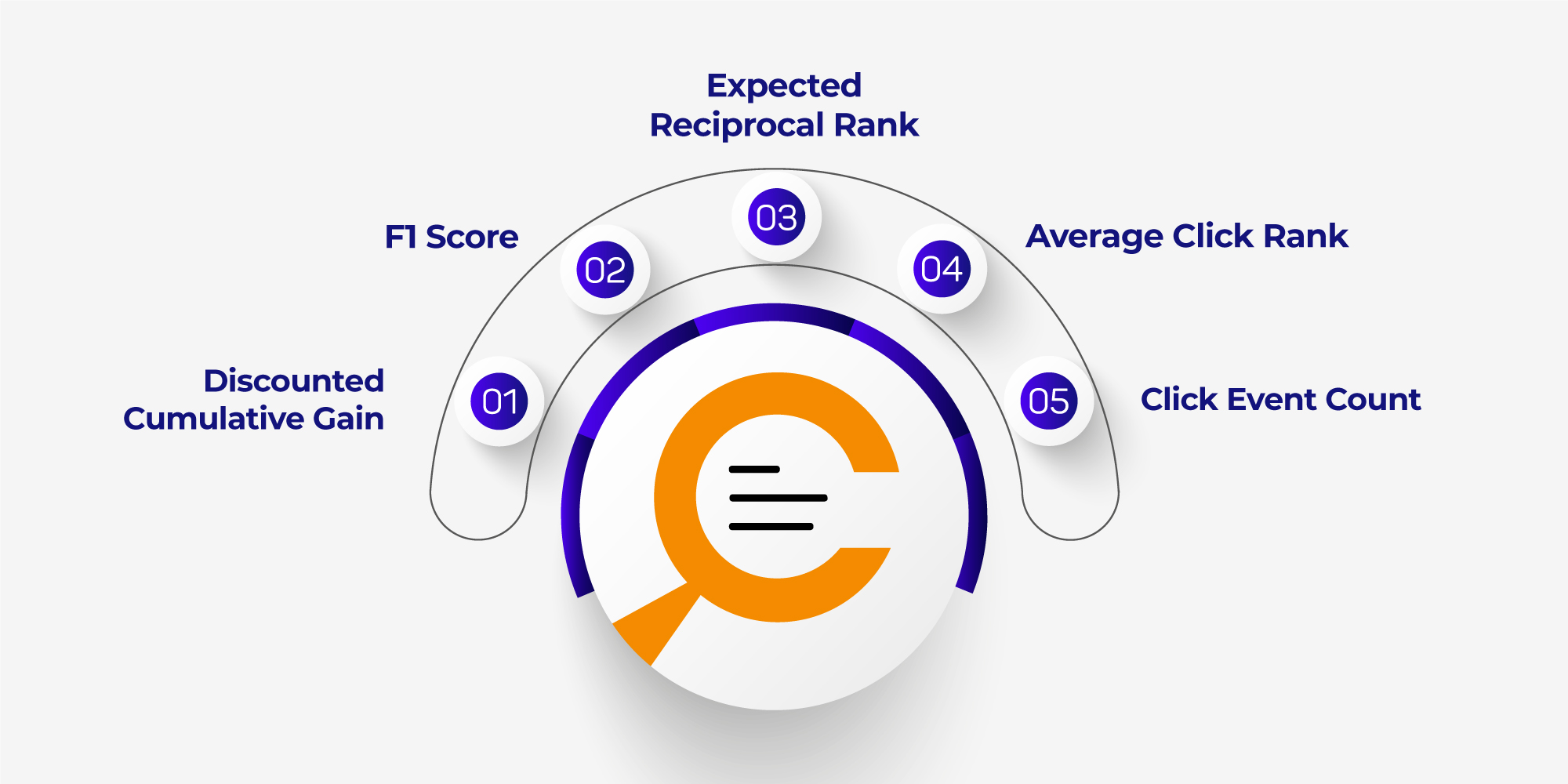
Forrester found that 43% of visitors head straight to the search box, while searchers are 2-3 times more likely to convert than non-searchers, highlighting the critical importance of search relevance.
Imagine this: you enter a library brimming with knowledge, but the librarian speaks a different language. You ask for a recipe to bake a cake, but instead, get handed a book on astrophysics. Frustrating, right? This is exactly what happens when search relevance goes awry. In today’s digital world, where information overload reigns supreme, search engines are our trusty librarians. But if the results they deliver are irrelevant, it’s like wandering through a maze with no exit.
The good news? You hold the key to building a search function that delights users. By understanding search relevance metrics, you can ensure your search engine becomes a beacon, guiding users precisely to the information they crave.
This blog post equips you with the top 5 search relevance metrics, acting as your compass to navigate the exciting world of user satisfaction and engagement through effective search.
Lost in the Search Abyss? How to Deliver Results Users Crave with These Search Relevance Metrics

So, you’re committed to building a search engine that users will love. But how do you measure success? Here’s where search relevance metrics come into play. These metrics act as your measuring tape, revealing how well your search engine aligns with user intent.
Here are the top 5 essential metrics to keep in your search relevance toolbox:
1. Discounted Cumulative Gain (DCG)
Imagine a stack of gold bars, with the most valuable placed on top. DCG treats search results like this stack, assigning higher scores to the most relevant results at the top of the search page. It’s a fancy way of measuring the quality and effectiveness of the search results and assigning scores to these results based on their relevancy; the most relevant result gets a higher score, and the least relevant search results get a lower score.
The formula for DCG is:

where, reli refers to the graded relevance of the document in the ranked list at position i. And P refers to the number of results considered for evaluation.
Let me explain you in a different way: a user searches for the ‘best laptops ’ and then 10 (P=10) search results appear on the search result page. Now the results appearing on the top of the search results page will be more relevant and given the highest score. For instance, a score “3” is assigned to the first result, which indicates its high relevance.
2. F1 Score
Ever felt stuck choosing between two great options? F1 Score feels your pain. It merges two crucial metrics, precision (accuracy of results) and recall (whether all relevant results are included), into a single score.
The maximum F1 score is 1, and 0 is the minimum. Let’s say the F1 score is 1, which means that both precision and recall are accurate and search results are highly relevant based on the user search query. Therefore, this metric serves as an indicator of the overall performance of the search engine.
Here is the formula for the F1 score

Search improves the precision and recall in order to optimize the F1 score thus ensuring relevant and comprehensive results.
3. Expected Reciprocal Rank (ERR)
This metric evaluates the quality of the top-ranking search results on the search results page. It not only considers the documents’ order but also checks their relevance in the information retrieval systems.
So what’s more? Well, ERR also assesses the probability of the user checking the documents ranked at various positions on the search results page. Think of it as a gauge of user satisfaction with the top results. A higher ERR signifies happy users who find what they need quickly.
4. Average Click Rank
Where do users click? ACR tells all. It calculates the average position of clicked results on the search page.
Here is the formula for calculating Average click rank:

Lower click ranks signify higher relevancy. It means that users are likely to click on results on the top of the search results page, suggesting that those results are more relevant and prominently displayed.
On the contrary, if the average click rank is higher, the user has to go down to the search results page to find the relevant information. Hence, the lower the average click rank indicates the relevance of search results and ensures customer satisfaction.
5. Click Event Count
Not all clicks are created equal, but click event count gives you a big-picture view of user engagement with your search results.
The more clicks a particular search result gets, the more likely it is to be relevant to a broad range of users. However, it doesn’t tell the whole story – were users truly satisfied with the content they clicked on.
By monitoring these metrics, you gain valuable insights into how well your search engine performs. Remember, the ultimate goal is to use these insights to continuously refine your search experience, ensuring users leave with a smile (and the information they need).
Transforming Insights into Action: Dive Deeper into the Hows and Whys of Search Relevance
Understanding search relevance metrics is a crucial first step. But the true magic happens when you translate these insights into actionable improvements within your search engine.
Imagine a sculptor with a block of marble. The metrics are the tools that help analyze the marble, revealing its potential. However, it’s the sculptor’s skill and vision that transform the raw material into a masterpiece. Here’s how you can take action by continuously refining algorithms, prioritizing highly relevant results, and adapting to evolving user behavior.
Transform your search engine from good to great. Download your free white paper today!


















